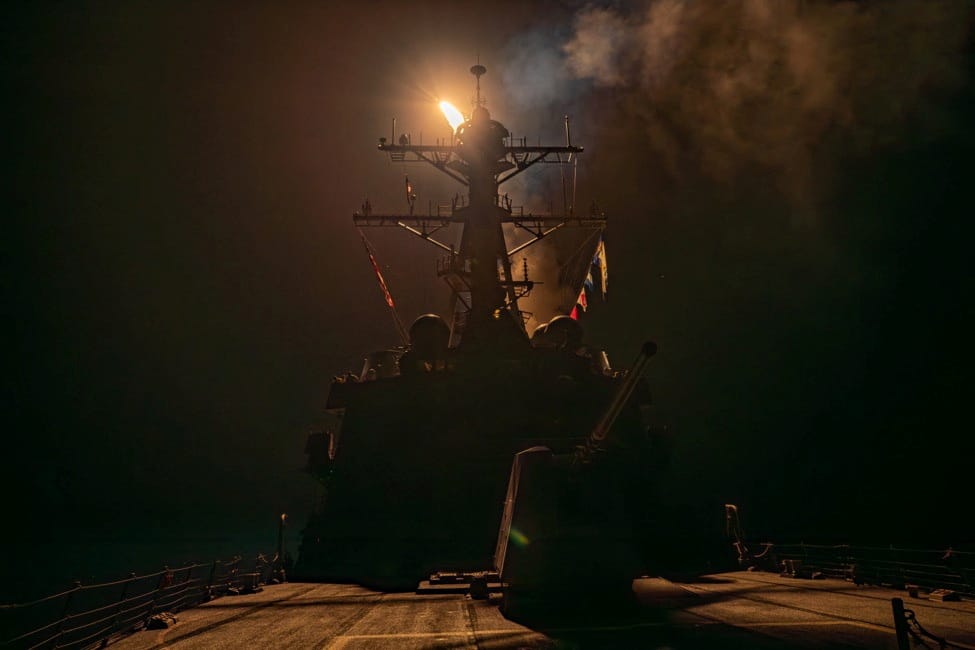The US and UK launch strikes on Houthi targets in Yemen in response to Red Sea attacks
Over the weekend, the US and the UK carried out a series of strikes on around 30 Houthi areas in Yemen.

A few minutes every morning is all you need.
Stay up to date on the world's Headlines and Human Stories. It's fun, it's factual, it's fluff-free.
The backstory: Since the October 7 attacks carried out by Hamas in Israel, Israel has been on a large-scale offensive in the Gaza Strip. The attacks killed around 1,200 civilians in Israel, and the attackers took hundreds of Israeli hostages back to Gaza. It sparked a military response by Israel that has killed over 23,000 Palestinians, according to the Hamas-run Gaza health ministry. But the conflict has spread in the region, with Iran-backed groups like Hezbollah in Lebanon and the Houthis in Yemen getting involved.
The Houthis are a political militant group that controls much of Yemen, and over the last few months, they’ve been attacking ships in the Red Sea, an important international shipping waterway. They initially said the attacks were against Israel-linked ships in support of Palestine, but they’ve also attacked commercial ships that don’t seem to have any links to Israel.
More recently: As the attacks in the Red Sea have continued, many shipping companies have stopped operating in the area. Ships have had to take the long route around Africa, raising costs and sparking worries about a new wave of inflation and global supply chain issues. According to the US, about 15% of the world’s seaborne trade passes through the waterway, including 8% of global grain, 12% of seaborne oil and 8% of the world's liquified natural gas.
Last month, the US and several other countries, including the UK, Canada, France, Italy, the Netherlands, Norway, the Seychelles and Spain, formed a coalition force to patrol the Red Sea and protect ships from the Houthis. Earlier this month, the US and allies warned the Houthis to stop attacking ships in the Red Sea, or they’d have to “bear the responsibility of the consequences”. But the Houthis have insisted they won’t stop until Israel ends its offensive on Gaza and food and aid is let into the Strip.
The development: Over the weekend, the US and the UK carried out a series of strikes on around 30 Houthi areas in Yemen, saying the strikes were "designed to degrade the Houthis' ability to attack maritime vessels." Yemen’s official government, which has been in a civil war with the Houthis for years, condemned the group for "dragging the country into conflict." But the Houthis have promised they will retaliate with a "strong and effective" response.
Meanwhile, as the Israel/Palestine conflict marked its 100th day, tens of thousands of protestors around the world took to the streets to call for a ceasefire. On Sunday, a pro-Israel rally saw thousands of people protesting in London, calling for the release of Israeli hostages. Israel is currently defending itself from accusations of genocide brought by South Africa in the UN’s International Court of Justice.
Key comments:
"These targeted strikes are a clear message that the United States and our partners will not tolerate attacks on our personnel or allow hostile actors to imperil freedom of navigation," US President Joe Biden said.
Following the strikes, Biden said the country had delivered a “private message” to Iran about the Houthis. "We delivered it privately and we're confident we're well-prepared," he said.
"I know we have degraded (their) capability," US Lieutenant General Douglas Sims told a media briefing. "I don't believe that they would be able to execute the same way they did the other day. But we will see."
“I would expect that they will attempt some sort of retaliation,” Sims said on Friday, saying that would be a mistake. “We simply are not going to be messed with here.”
British Prime Minister Rishi Sunak said on Friday the strikes were an act of “self-defense,” adding that the aim was to “de-escalate tensions and to restore stability to the region.”
"Our stance is unwavering, we will (continue) to stand with our brothers in Palestine and Gaza until victory and until all Palestinian land is liberated - not just Gaza," said Hussein Kabsi, a retired government employee in Yemen.
“The US should realise that the security of the Red Sea, Lebanon, Iraq and Yemen are all hinged on one single thing: putting an end to the war in Gaza,” said Hezbollah’s leader Hassan Nasrallah in a televised speech on Sunday. “Rather than providing a remedy to the symptoms, they should treat the cause.”




Comments ()